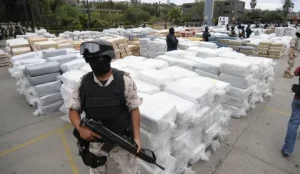The history of drug policy in Mexico stretches back to the early 20th century, a period marked by stringent prohibition measures. During this era, Mexico, like many other nations, adopted a hardline stance against narcotics, driven by international pressure and a growing concern over public health and morality. The initial policies characterized by strict bans on the production, distribution, and consumption of various drugs. This prohibitionist approach aimed to curb drug use through punitive measures, reflecting the global trend of the time.
In recent years, however, Mexico has experienced significant shifts in its drug policy, moving towards decriminalization and regulation. This transformation marks a departure from the traditional punitive model to a more progressive framework that emphasizes public health and human rights. The decriminalization efforts have primarily focused on reducing the penalties for small-scale drug possession, aiming to alleviate the burden on the criminal justice system and redirect resources towards more effective interventions. Additionally, regulatory measures have been introduced to control the legal production and distribution of certain substances, such as cannabis, thereby creating a legal market that undermines the illicit drug trade.
Current Challenges in Drug Enforcement

The reforms in Mexico’s drug policy have had a profound impact on current enforcement strategies. The shift towards decriminalization and regulation necessitates a reevaluation of traditional law enforcement tactics, which were primarily designed to combat drug trafficking and penalize drug users. As a result, enforcement agencies are now tasked with adapting to a new landscape where the focus is on harm reduction and public health rather than punitive measures. This transition presents both opportunities and challenges, as authorities must balance the enforcement of new regulations with the need to dismantle organized crime networks.
Challenges also arise from inconsistencies in Mexico’s drug policy. While there have been efforts to decriminalize certain substances and regulate their use, the implementation of these reforms has not been uniform across the country. Regional disparities in policy enforcement can create confusion and undermine the overall effectiveness of the reforms. For instance, some states may continue to enforce strict drug laws, while others adopt more lenient approaches, leading to a fragmented legal landscape that complicates national drug policy efforts.
Impact of Drug Policy on Public Health
One of the most significant outcomes of Mexico’s drug policy reforms has been the reduction in drug-related violence. By decriminalizing small amounts of drugs and regulating their distribution, the government aims to weaken the power of drug cartels and reduce the incentives for violent competition over the illicit drug market. This strategy has shown promise in decreasing the levels of violence associated with the drug trade, as it shifts the focus from criminalization to control and oversight.
Moreover, changes in Mexico’s drug policy have improved access to addiction treatment. The decriminalization of drug use allows individuals struggling with addiction to seek help without the fear of legal repercussions. This shift towards a public health approach emphasizes the importance of providing comprehensive treatment and support services for those affected by substance abuse. By prioritizing treatment over punishment, Mexico’s drug policy reforms aim to address the root causes of addiction and promote long-term recovery.
Economic Implications of Drug Reforms
Mexico’s drug policy reforms also carry significant economic implications. By creating a legal framework for the production and distribution of certain drugs, the government can generate substantial revenue through taxation and regulation. This potential boost in economic growth can provide much-needed funds for public services and infrastructure, contributing to the overall development of the country.
Additionally, the reforms may reduce law enforcement expenditures in Mexico. The traditional approach of combating drug use through punitive measures requires significant resources for policing, judicial processes, and incarceration. By decriminalizing small-scale possession and focusing on regulation, the government can redirect these resources towards more effective and cost-efficient strategies, such as prevention and treatment programs. This reallocation of funds can lead to a more sustainable and balanced approach to drug policy.
Case Studies of Successful Drug Policy Reforms
One notable example of successful drug policy reform in Mexico is the decriminalization of small amounts of drugs. In 2009, Mexico passed legislation that decriminalized the possession of small quantities of various substances, including marijuana, cocaine, and heroin. This move aimed to reduce the burden on the criminal justice system and shift the focus towards treatment and rehabilitation. The decriminalization policy has been praised for its potential to reduce the stigma associated with drug use and encourage individuals to seek help for addiction.
Another key aspect of Mexico’s drug policy reforms is the focus on harm reduction strategies. This approach prioritizes minimizing the negative consequences of drug use rather than solely aiming for abstinence. Harm reduction initiatives include measures such as needle exchange programs, supervised injection sites, and the distribution of naloxone to prevent opioid overdoses. By implementing these strategies, Mexico aims to reduce the health risks associated with drug use and improve the overall well-being of individuals and communities.
Public Opinion on Drug Legalization
Public support for Mexico’s drug policy reforms has been steadily increasing. As the negative consequences of the traditional prohibitionist approach become more apparent, more people are recognizing the potential benefits of decriminalization and regulation. Surveys indicate that a growing number of Mexicans favor a more progressive drug policy that prioritizes public health and harm reduction over punitive measures. This shift in public opinion reflects a broader trend towards rethinking the approach to drug use and addiction.
Mexico’s drug policy reforms have also impacted public safety perceptions. By reducing drug-related violence and improving access to treatment, the reforms aim to create safer communities. While they are still have challenges to be addressed, such as ensuring consistent implementation and addressing organized crime, the overall impact on public safety has been positive. Communities that have embraced harm reduction strategies report lower levels of drug-related harm and improved quality of life.
Future Directions for Mexico’s Drug Policy

As Mexico continues to navigate the complexities of drug policy reform, exploring alternative strategies remains crucial. One potential direction is the expansion of regulated markets for substances beyond cannabis. By creating legal frameworks for the production and distribution of other drugs, Mexico can further undermine the illicit drug trade and generate additional revenue for public services. This approach requires careful consideration of potential risks and benefits, as well as robust regulatory mechanisms to ensure public safety.
Reevaluating enforcement tactics is also essential for the future of Mexico’s drug policy. Traditional law enforcement strategies focused on criminalization and punishment have proven ineffective in addressing the root causes of drug use and addiction. Instead balanced approach that combines regulation, harm reduction, and treatment is needed. This shift requires collaboration between law enforcement, public health agencies, and community organizations to develop comprehensive and sustainable solutions.
Conclusion:
In conclusion, Mexico’s drug policy reforms represent a significant shift towards a more progressive and effective approach to addressing drug use and addiction. While challenges remain, the emphasis on decriminalization, regulation, and harm reduction offers a promising path forward. By prioritizing public health, reducing violence, and exploring innovative strategies, Mexico can continue to make strides towards a more balanced and humane drug policy.




